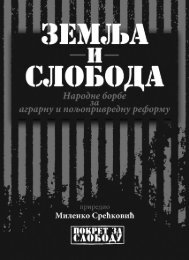- Page 3 and 4:
KNJIGU PRIREDILIVladislav Bailović
- Page 5 and 6:
ka izbegla iskušenje da stasava na
- Page 7 and 8:
Koordinacioni odbor radničkih prot
- Page 9 and 10:
nja, već i u čuvanju i učvršći
- Page 11 and 12:
napokon na Terazijama, ispred sedi
- Page 13 and 14:
obaveza. Radnici Šinvoza su ostali
- Page 15 and 16:
skupštinu, koju Stefanović već m
- Page 17 and 18:
neprekidnog propadanja. Ukoliko se
- Page 19 and 20:
Agencija odbija da prizna svoje gre
- Page 21 and 22:
PREDUZEĆA KOJA JOŠ UVEK NISU UNI
- Page 23 and 24:
Svesni teškog položaja u kojem se
- Page 25 and 26:
dikata i malih akcionara, kao što
- Page 27 and 28:
An-privazacioni protes u SrbijiU ra
- Page 29 and 30:
Pokret koji gradimo zasnovan je na
- Page 31 and 32:
kažu da je dosta. Poražavajuće j
- Page 33 and 34:
nego se njeni članovi uglavnom pon
- Page 35 and 36:
poduhvatu; očuvanje postojećih ra
- Page 37 and 38:
Nakon tribine, Koordinacionom odbor
- Page 39 and 40:
firmama uz popust veći od 30%. Za
- Page 41 and 42:
zeće - Stefanoviću se godinama to
- Page 43 and 44:
što znači da preko dve i po hilja
- Page 45 and 46:
pravcu u kojem smo hteli da krenemo
- Page 47 and 48:
edom nad Stefanovićem pre nego št
- Page 49 and 50:
štititi time što ćemo kolegama i
- Page 51 and 52:
završiti do kraja sledeće godine.
- Page 53 and 54:
Ko uspeh pretvara u aferu??Saopšte
- Page 55 and 56:
ponosni na sebe. Oni kojima to smet
- Page 57 and 58:
sindikata. Podsetimo, na primer, da
- Page 59 and 60:
je nemoguće u potpunosti uspostavi
- Page 61 and 62:
Trgovinskog suda izveštaj o steča
- Page 63 and 64:
kusa oko srpskog prestola, realan u
- Page 65 and 66:
Noam Čomskipodržao apel Pokreta z
- Page 67 and 68:
Pismo Industrijskih radnika sveta (
- Page 69 and 70:
smo ušli zajedno sa preminulim kol
- Page 71 and 72:
što je otpustio radnike obezbeđen
- Page 73 and 74:
Radnici i akcionari doneli odluku d
- Page 75 and 76:
- Pošto radnici i mali akcionari n
- Page 77 and 78:
Odbor građana za podršku radnicim
- Page 79 and 80:
naša prava nametnu iznad interesa
- Page 81 and 82:
koje ugovorne obaveze otvara moguć
- Page 83 and 84:
nim godinama. Pokazali su i dokazal
- Page 85 and 86:
Ivkovićevih firmi i ad „Šinvoz
- Page 87 and 88:
Agencija za privazaciju:Nismo odgov
- Page 89 and 90:
Saopštenje za javnostAnketnog odbo
- Page 91 and 92:
kupca u postupku stečaja u trenutk
- Page 93 and 94:
zahvaljujući kom je broj radnika s
- Page 95 and 96:
sa zahtevom da vlasnici isplate ono
- Page 97 and 98:
adnika iz više gradova ispred Agen
- Page 99 and 100:
uzela stav da nekakav moćni i boga
- Page 101 and 102:
Zastava Elektro, RačaTokom današn
- Page 103 and 104:
Takođe napominjemo da je nova upra
- Page 105 and 106:
skine ugovor sa kupcima koji su upr
- Page 107 and 108:
Dakle, svi mehanizmi da se u ''Zast
- Page 109 and 110:
Saopštenještrajkačkog odbora ’
- Page 111 and 112:
Saopštenještrajkačkog odbora ''Z
- Page 113 and 114:
Saopštenjepovodom policijskog delo
- Page 115 and 116:
Protest ispredAgencije za privazaci
- Page 117 and 118:
vor o privatizaciji. Za početak Iv
- Page 119 and 120:
organizovali ''tribinu na kojoj bi
- Page 121 and 122:
pomakom, a pogotovo spremni da se v
- Page 123 and 124:
Na čijoj je strani isnaIskustvo
- Page 125 and 126:
je na kraju i doveo do raskida priv
- Page 127 and 128:
uveli više odgovornosti prema obi
- Page 129 and 130:
udu odvijali transparentno, uz uče
- Page 131 and 132:
građanima, ali verovatno u skladu
- Page 133 and 134:
korporacija, koja je nedavno kupila
- Page 135 and 136:
Verica Baraćo radnicima ''Zastave
- Page 137 and 138:
Đukić Dejanović, predsednica SPS
- Page 139 and 140:
onim preduzećima u kojima se ne is
- Page 141 and 142:
ordinacionom odboru radničkih prot
- Page 143 and 144:
Trudbenik gradnjaOptužba za terori
- Page 145 and 146:
zaciju je ovakvo ponašanje toleris
- Page 147 and 148:
enik gradnje“ koje je i sama utvr
- Page 149 and 150:
zeća blokiran već skoro godinu da
- Page 151 and 152:
u javnom životu Srbije se po prvi
- Page 153 and 154:
dan detalj koji ni na jednom dosada
- Page 155 and 156:
noj eksploataciji, a da u Srbiji i
- Page 157 and 158:
Sa protestima ispred Ministarstva e
- Page 159 and 160:
»Trudbenik« - godinu dana kasnije
- Page 161 and 162:
čega je uprava preduzeća pre priv
- Page 163 and 164:
ko ne mogu biti argument da Agencij
- Page 165 and 166:
doslovce stoji da »nemogućnošću
- Page 167 and 168:
drastično kršenje zakona i ugovor
- Page 169 and 170:
fikasnosti ostalih subjekata i inst
- Page 171 and 172:
ovo krivično delo, u znak solidarn
- Page 173 and 174:
i gazdu da se nagode, Dinkić ih je
- Page 175 and 176:
odana Gajića iz Trske kod Rače kr
- Page 177 and 178:
dinostima neće dozvoliti da se oni
- Page 179 and 180:
SrbolekRadnička raskršćaRazliči
- Page 181 and 182:
U petak 22. januara, Zoran Gočevi
- Page 183 and 184:
kršenja Zakona o preuzimanju akcio
- Page 185 and 186:
odustanu od svog stanovišta, kolik
- Page 187 and 188:
Zrenjaninski radnici okupljeni oko
- Page 189 and 190:
se okolnosti u međuvremenu nešto
- Page 191 and 192:
Štrajkački odbor »Srboleka«- is
- Page 193 and 194:
Blokada distribucije robeKap je pre
- Page 195 and 196:
U »Srboleku« se štrajk nastavlja
- Page 197 and 198:
će on zauzvrat povući otkaze, to
- Page 199 and 200:
Štrajk prekinut, problemi ostaliPo
- Page 201 and 202:
Saopštenje radnikai malih akcionar
- Page 203 and 204:
uništavanje fabrike. Naravno da ho
- Page 205 and 206:
problem je i dalje bila isplata zao
- Page 207 and 208:
spreči mogućnost zapošljavanja p
- Page 209 and 210:
danju, Agencija je demonstrirala me
- Page 211 and 212:
’’BEK’’ - jedan drasčan pr
- Page 213 and 214:
davac). Novembra 2006. godine, Beš
- Page 215 and 216:
Potpuno je jasno da im se moramo su
- Page 217 and 218:
otpremninom od 100 evra po godini s
- Page 219 and 220:
duzećima sa ovog područja. Nezado
- Page 221 and 222:
Naporedo sa ovom birokratskom bajko
- Page 223 and 224:
zastupnik radnika, izvjesni beograd
- Page 225 and 226:
skih obećanja bar dobiti otpremnin
- Page 227 and 228:
Ministarstvo ekonomije i regionalno
- Page 229 and 230:
vlasnika. Traže da rade u svojoj f
- Page 231 and 232:
isti oni kolektivi koji su rešili
- Page 233 and 234:
- korporativno odgovorni zagađiva
- Page 235 and 236:
Notorno je, uostalom, da ni jedan D
- Page 237 and 238:
gde im je od kvalifikacija potrebno
- Page 239 and 240:
Sadašnja podrška borbi radnika Š
- Page 241 and 242:
pozove na juriš u borbu za spas Sr
- Page 243 and 244:
motivi da Veterinarski zavod ne uđ
- Page 245 and 246:
oj radnika da se učlani u konzorci
- Page 247 and 248:
Očuvanje jedinstva Konzorcijuma je
- Page 249 and 250:
Zbog čitavog tog stresa jako mi se
- Page 251 and 252:
desilo i svi ti problemi koje sada
- Page 253 and 254:
U podnožju kapitalizmaIntervju sa
- Page 255 and 256:
smo izašli sa još većim gubicima
- Page 257 and 258:
nje, nekih stotinak je bilo za njeg
- Page 259 and 260:
urađeno. Menadžer i dalje ostaje
- Page 261 and 262:
privatizovana je da bi radila; drž
- Page 263 and 264:
nas je doveo u stečaj, on da nared
- Page 265 and 266:
Kada je počela ta golgota u Saraje
- Page 267 and 268:
Dodatni tekstoviKo da manje!?Izmeđ
- Page 269 and 270:
azdeliš lopovima, da bi posle reka
- Page 271 and 272:
“privrednici” su imali taman to
- Page 273 and 274:
Ekonomska kriza u raljama ideologij
- Page 275 and 276:
Zarobljena svojinaJedino pravo koje
- Page 277 and 278:
Na inicijativu radnika akcionara "S
- Page 279 and 280:
(MNK), koje potiskuju mnoga lokalna
- Page 281 and 282:
vlasnika i akumulacije ekonomske i
- Page 283 and 284:
Ko su "nevidljivi radnici" u Sloven
- Page 285 and 286:
Lekcija iz leviceKoliko god da se e
- Page 287 and 288:
Regionalni centralizamSećate se, s
- Page 289 and 290:
Osvrt na borbu pojedinih radničkih
- Page 291 and 292:
koji su sada u štrajku. Deo štraj
- Page 293 and 294:
oru za privatizaciju Narodne skupš
- Page 295 and 296:
Novi radničkipokre u Srbiji - cilj
- Page 297 and 298:
Kopčalić jeste narušio kontinuit
- Page 299 and 300:
Iz blokade u blokaduRadnici i mali
- Page 301 and 302:
sno Ministarstvu ekonomije i region
- Page 303 and 304: Trgovinski sud je na zahtev malih a
- Page 305 and 306: su uspeli da iznude sudski proces u
- Page 307 and 308: vanju neodgovornih novih vlasnika k
- Page 309 and 310: Početni oblici samoorganizovanja i
- Page 311 and 312: du, kao i ogromna većina u narodu,
- Page 313 and 314: stranke nije baš najbolji. Zato im
- Page 315 and 316: je regionalni parlament Vojvodine d
- Page 317 and 318: plasmanom lekova koji se proizvode
- Page 319 and 320: property.” It was thus a really g
- Page 321 and 322: Of course, while the new owners are
- Page 323 and 324: crucified in the national media as
- Page 325 and 326: Realizing that he was going to loos
- Page 327 and 328: Chronology of fight for Jugoremedij
- Page 329 and 330: nomic Court to re-open the case. La
- Page 331 and 332: tions (even though in April 2008 th
- Page 333 and 334: This last provision is imperative,
- Page 335 and 336: Bankruptcy to nullify all the compa
- Page 337 and 338: What do you intend to do now?Our ma
- Page 339 and 340: Establishing a Coordinang Commiee f
- Page 341 and 342: It is precisely for this reason tha
- Page 343 and 344: esenting workers from 3 cities and
- Page 345 and 346: pen. This is because a good portion
- Page 347 and 348: terests and demands of the actual w
- Page 349 and 350: situation in Serbia is understood a
- Page 351 and 352: up for the preservation of our jobs
- Page 353: Leer of support for the protests by
- Page 357 and 358: workers, we witnessed the union act
- Page 359 and 360: children live in families in which
- Page 361 and 362: JugoremedijaJugoremedija, Zrenjanin
- Page 363 and 364: Saopštenje za javnostAnketnog odbo
- Page 365 and 366: Podrška borbi radnika Trudbenik gr
- Page 367 and 368: 366’’BEK’’ - jedan drasčan
- Page 369 and 370: Drugi o namaLeto protesta- Boris Ka
- Page 371: CIP - Каталогизација




